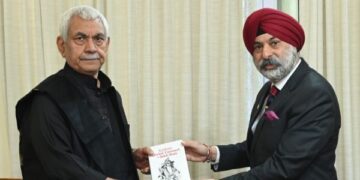Srinagar: Vice-Chancellor of University of Kashmir Prof Talat Ahmad Wednesday called for mainstreaming disaster management into academia and development policy to put in place a robust disaster response system on the ground.
Addressing as chief guest the inaugural session of a day-long webinar “Mainstreaming Disaster Management in Higher Educational Institutions”, Prof Talat said the Himalayan region is prone to disasters and this calls for a serious integrated approach to disaster management.
Asserting that world leaders cannot afford to be in denial over impending dangers posed by climate change, he said it was important for academic institutions, especially in the Himalyan region and country’s other vulnerable areas, to come together and help in mainstreaming disaster management into curriculums.
The Vice-Chancellor called for a survey of all important buildings in J&K UT—hospitals, colleges, schools and government offices—to evaluate how safe these are to withstand disasters.
“There’s a need for a continuous monitoring system in disaster-prone areas, like important highways, for prior alerts in case of any disaster-related activity,” he said, adding that development in disaster-prone areas must be done away with alongside ensuring that people and policy-planners strictly adhere to building codes while undertaking constructions.
Prof Talat also called for establishing well-equipped communication centres in vulnerable areas for swift communication between various agencies in times of disasters.
The national-level webinar was organised by the varsity’s Department of Geography and Disaster Management (DGDM) and J&K’s Higher Education Department (HED).
In his keynote address, Commissioner-Secretary, HED Talat Pervez Rohella proposed a five-pronged strategy for disaster management, including developing core competencies of students and faculty in colleges, holding regular mock drills for an effective response system, devising mitigation strategies with proper planning, and creating space in all colleges to establish disaster response centers.
In her lead lecture, Prof Janki Andhari, Dean, Jamsetji Tata School of Disaster Studies, TISS Mumbai, said disasters aren’t a result of a single event and therefore any event-centric approach to handle disasters is not advisable.
“To treat disasters as a one-off event is fundamentally problematic,” she said.
Prof Andhari said 85 per-cent of the country is vulnerable to earthquakes, floods, droughts, cyclones and landslides, even as more than 500 million people are affected by natural disasters annually.
Advocating a “shift” in understanding disaster management, she said community-based approaches, increasing awareness, use of appropriate technologies and indigenous methods could go a long way in mainstreaming disaster management.
KU Registrar Dr Nisar A Mir said hybrid disasters wreak havoc in terms of deaths, physical injuries, financial losses, damage to infrastructure, stress and trauma and this calls for an urgent and serious intervention by policy-planners, academic institutions, NGOs and citizens to devise effective disaster management policies and frameworks.
Prof Shamim A Shah, Head of KU’s DGDM, delineated objectives of the webinar, and stressed on creation of more faculty positions in disaster management in J&K’s higher educational institutions in line with the government’s commitment.
“We need to make society disaster-resilient by way of generating awareness and capacity-building of people at large,” he said.
Prof M Y Peerzada, Director Colleges, delivered a vote of thanks at the inaugural session, which was followed by a panel discussion by eminent academics and administrators, including Prof Shakil A Romshoo, Prof M Y Peerzada, Prof Shamim A Shah, Prof M Sultan Bhat, Prof Yasmeen Ashai, Prof Ravinder Kumar Tikoo, Prof Chandan Ghosh, Dr G M Dar and Er Aamir Ali.
Dr Mohammad Shafi conducted proceedings of the webinar.






